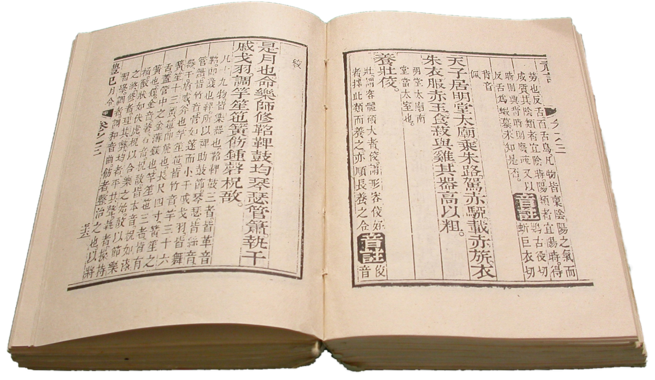
Main Difference
The main difference between Drama and Melodrama is that the Drama is a artwork intended for performance, formal type of literature and Melodrama is a dramatic work that exaggerates plot and characters in order to appeal to the emotions.
-
Drama
Drama is the specific mode of fiction represented in performance: a play, opera, mime, ballet, etc, performed in a theatre, or on radio or television. Considered as a genre of poetry in general, the dramatic mode has been contrasted with the epic and the lyrical modes ever since Aristotle’s Poetics (c. 335 BC)—the earliest work of dramatic theory.The term “drama” comes from a Greek word meaning “action” (Classical Greek: δρᾶμα, drama), which is derived from “I do” (Classical Greek: δράω, drao). The two masks associated with drama represent the traditional generic division between comedy and tragedy.
In English (as was the analogous case in many other European languages), the word play or game (translating the Anglo-Saxon pleġan or Latin ludus) was the standard term for dramas until William Shakespeare’s time—just as its creator was a play-maker rather than a dramatist and the building was a play-house rather than a theatre.The use of “drama” in a more narrow sense to designate a specific type of play dates from the modern era. “Drama” in this sense refers to a play that is neither a comedy nor a tragedy—for example, Zola’s Thérèse Raquin (1873) or Chekhov’s Ivanov (1887). It is this narrower sense that the film and television industries, along with film studies, adopted to describe “drama” as a genre within their respective media. The term ‘Radio drama has been used in both senses—originally transmitted in a live performance. May also refer to the more high-brow and serious end of the dramatic output of radio.
The enactment of drama in theatre, performed by actors on a stage before an audience, presupposes collaborative modes of production and a collective form of reception. The structure of dramatic texts, unlike other forms of literature, is directly influenced by this collaborative production and collective reception.Mime is a form of drama where the action of a story is told only through the movement of the body. Drama can be combined with music: the dramatic text in opera is generally sung throughout; as for in some ballets dance “expresses or imitates emotion, character, and narrative action”. Musicals include both spoken dialogue and songs; and some forms of drama have incidental music or musical accompaniment underscoring the dialogue (melodrama and Japanese Nō, for example). Closet drama is a form that is intended to be read, rather than performed. In improvisation, the drama does not pre-exist the moment of performance; performers devise a dramatic script spontaneously before an audience.
-
Melodrama
A melodrama is a dramatic work in which the plot, which is typically sensational and designed to appeal strongly to the emotions, takes precedence over detailed characterization. Melodramas typically concentrate on dialogue, which is often bombastic or excessively sentimental, rather than action. Characters are often simply drawn, and may appear stereotyped. Melodramas are typically set in the private sphere of the home, and focus on morality and family issues, love, and marriage, often with challenges from an outside source, such as a “temptress”, or an aristocratic villain. A melodrama on stage, film or television is usually accompanied by dramatic and suggestive music that offers cues to the audience of the drama being presented.
In scholarly and historical musical contexts, melodramas are Victorian dramas in which orchestral music or song was used to accompany the action. The term is now also applied to stage performances without incidental music, novels, movies, television and radio broadcasts. In modern contexts, the term “melodrama” is generally pejorative, as it suggests that the work in question lacks subtlety, character development, or both. By extension, language or behaviour which resembles melodrama is often called melodramatic; this use is nearly always pejorative.
-
Drama (noun)
A composition, normally in prose, telling a story and intended to be represented by actors impersonating the characters and speaking the dialogue
-
Drama (noun)
Such a work for television, radio or the cinema (usually one that is not a comedy)
-
Drama (noun)
Theatrical plays in general
-
Drama (noun)
A situation in real life that has the characteristics of such a theatrical play
-
Drama (noun)
Rumor, lying or exaggerated reaction to life events; melodrama; an angry dispute or scene; intrigue or spiteful interpersonal maneuvering.
-
Melodrama (noun)
A kind of drama having a musical accompaniment to intensify the effect of certain scenes.
-
Melodrama (noun)
A drama abounding in romantic sentiment and agonizing situations, with a musical accompaniment only in parts which are especially thrilling or pathetic. In opera, a passage in which the orchestra plays a somewhat descriptive accompaniment, while the actor speaks
“the melodrama in the grave digging scene of Beethoven’s “Fidelio”.”
-
Melodrama (noun)
Any situation or action which is blown out of proportion.
-
Drama (noun)
a play for theatre, radio, or television
“a gritty urban drama about growing up in Harlem”
-
Drama (noun)
plays as a genre or style of literature
“Renaissance drama”
-
Drama (noun)
the activity of acting
“drama school”
“teachers who use drama are working in partnership with pupils”
-
Drama (noun)
an exciting, emotional, or unexpected event or circumstance
“a hostage drama”
“an afternoon of high drama at Wembley”
